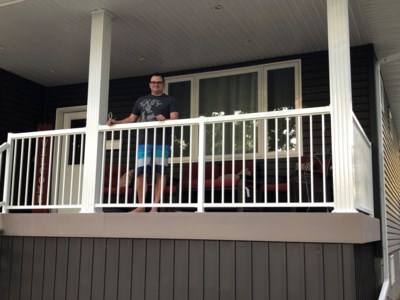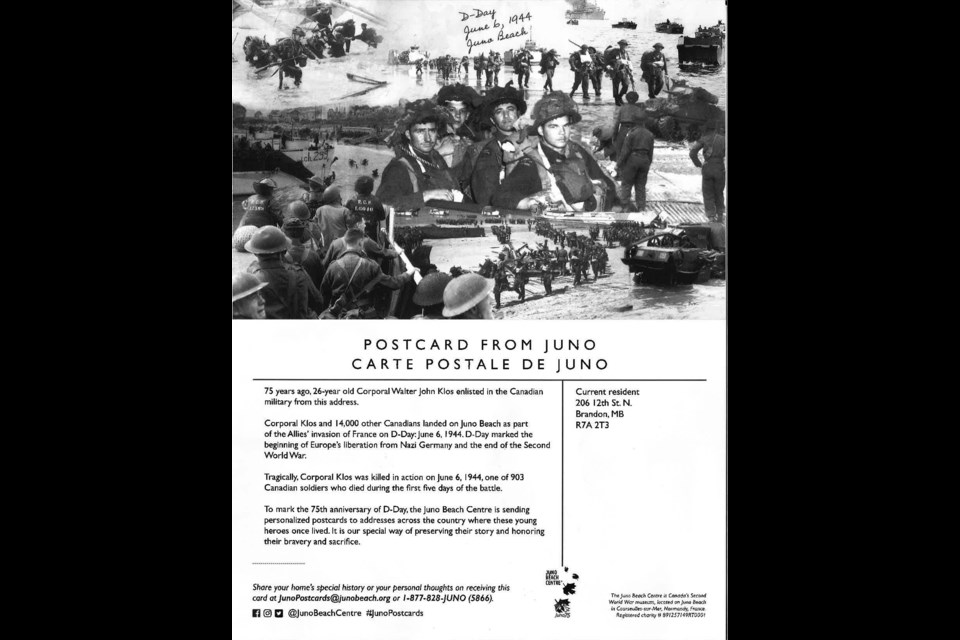Moose Jaw soldiers Roy Peebles Sr., William Gordon Williams and John Hilliard Noel Butler stormed Juno Beach on June 6, 1944 with 14,000 other Canadians as they began to liberate Western Europe from Nazi Germany, but all three men would be dead within a matter of days.
Williams, 23, a sergeant, was killed before he made it off the beach; Peebles, 22, a rifleman, died one day after landing on the beach, on June 7; Butler, 35, a rifleman, survived the landing but died two days later, on June 8. All three fought with the Regina Rifle Regiment, which was one of six units to land in the first wave.
In total, 359 Canadian soldiers were killed during the first five days — from June 6 to 10 — of what would become the Battle of Normandy, while 715 would be wounded or captured.
Peebles Sr., Williams and Butler are buried in Beny-sur-Mer Canadian War Cemetery, located 3.5 kilometres south of the village of Courselles.
Seventy-five years since Normandy invasion
June 6, 2019, marks the 75th anniversary of D-Day. Part of an overall plan called Operation Overlord, more than 156,000 Allied soldiers — Canadian, British and American — landed on a 75-kilometre stretch of heavily-defended beach on the northern coast of France.
By the end of D-Day, the Canadians had advanced the furthest inland, and then fought off repeated German counterattacks during the next three days.
To honour the Canadians killed on the beach or days later, along with this important milestone in Canadian history, the Juno Beach Centre in Courseulles-ser-Mer, Normandy, France is sending out personalized postcards to hundreds of homes across Canada linked to the soldiers who died there. The postcards include the name, rank and age of the soldier linked to each address.
“Letting someone know that a Canadian war hero left their house 75 years ago is a very special way of preserving the stories of these soldiers,” Mike Bechthold, executive Director of the Juno Beach Centre Association, said in a news release.
“It’s also a unique way to bridge the years and connect generations so young people today can get a glimpse into the lives of the young soldiers who once lived in their very homes — all of them volunteers.”
Recipients of “Postcards from Juno” are encouraged to share their home’s special history and their personal reflections on receiving the card, through social media (@JunoBeachCentre, #JunoPostcards).
John Hilliard Noel Butler, 1065 Willow Avenue
 Brad Rose and his wife bought the property at 1069 Willow Avenue that once contained two buildings that belonged to John Hilliard Noel Butler. His former address was 1065 Willow Avenue. Photo by Jason G. Antonio
Brad Rose and his wife bought the property at 1069 Willow Avenue that once contained two buildings that belonged to John Hilliard Noel Butler. His former address was 1065 Willow Avenue. Photo by Jason G. AntonioButler enlisted in the military on June 18, 1940.
Neither Butler’s house in Moose Jaw nor the actual home number exist anymore. Two small buildings that were on the property were torn down years ago so one large home could be built.
Brad Rose and his wife bought the property and the house at 1069 Willow Avenue five years ago, after moving from Moosomin. He knew about the two older structures, but doesn’t know what they looked like.
The postcard campaign is an interesting way to reach out and focus on guys who used to live on these properties, Rose said. It’s a good way to make people aware of the soldiers’ sacrifices, while the brevity of the postcard makes it simple and to the point.
“(Remembrance is) an important part of our history,” he added. “If people don’t talk about it, there is the fear of it fading away. This helps bring it to light.”
William Gordon Williams, 444 Coteau Street West
William, better known as Gordon, was born in Moose Jaw on Dec. 5, 1920 to William and Emma Williams, who were married in the United Church in 1910, according to the June Beach Centre website. Gordon was their only son, while they also had two older daughters, Mary and Alice. Gordon’s father died when Gordon was 18.
Gordon completed Grade 8 and worked as a labourer for Smith and Parkhill Building Contractors. He enlisted in the military on June 23, 1940 in Moose Jaw at age 19. Originally, he trained at the Canadian Signals Training Centre and then joined the Regina Rifle Regiment on Aug. 16, 1941 as a rifleman.
He embarked for the United Kingdom from Halifax, N.S. with the 1st Battalion on Aug. 24, 1941. From November 1941 until June 6, 1944, Gordon rose through the ranks to become a sergeant.
Gordon was killed in action on Juno Beach on June 6. His mother received a telegraph eight days later informing her that her only son had died in service of his country.
For the past 10 years, Gwen Wendzina has lived in the 1917-era house that Williams once occupied. She thought it was pretty cool that he used to occupy the building.
“Before I bought the house, it had an oil-burning furnace in the basement. I wonder if he was the one to put it in?” she said.
Sending out postcards is a good idea since it’s a good way to promote the city’s history, Wendzina continued. It’s positive that these young men who died for their country are being recognized. She thinks the campaign should turn out well.
Wendzina’s grandfather also served in the Second World War, but that is all she knows about the man.
“I think the next generation, they don’t know Canadian history a lot,” Wendzina said. She doubts that her grandchildren know much about the country’s military history; while they understand what Remembrance Day is all about, they don’t know much about any particular battle.
Roy Peebles, Sr., 449 Vaughan Street West
Peebles Sr., was born on March 16, 1922 to Peter and Margaret Peebles of Moose Jaw.
A member of the Anglican Church, Peebles Sr., was a student when he enlisted in the military on May 22, 1941.
Peebles Sr., was shipped to Britain with other members of the 1st Battalion and would later marry Lillian Doris of Salford, Lancashire, England. The two would produce a son, Roy Jr., but Peebles Sr. would never have the chance to watch his son grow up as he was killed one day after landing on Juno Beach.
Forty years later, CBC TV followed Roy Jr. from England to Regina as he looked for more information about this father. That news story, which aired on June 14, 1994, can be found on YouTube.
The house where Peebles Sr., grew up is now vacant.
Lest we forget.




